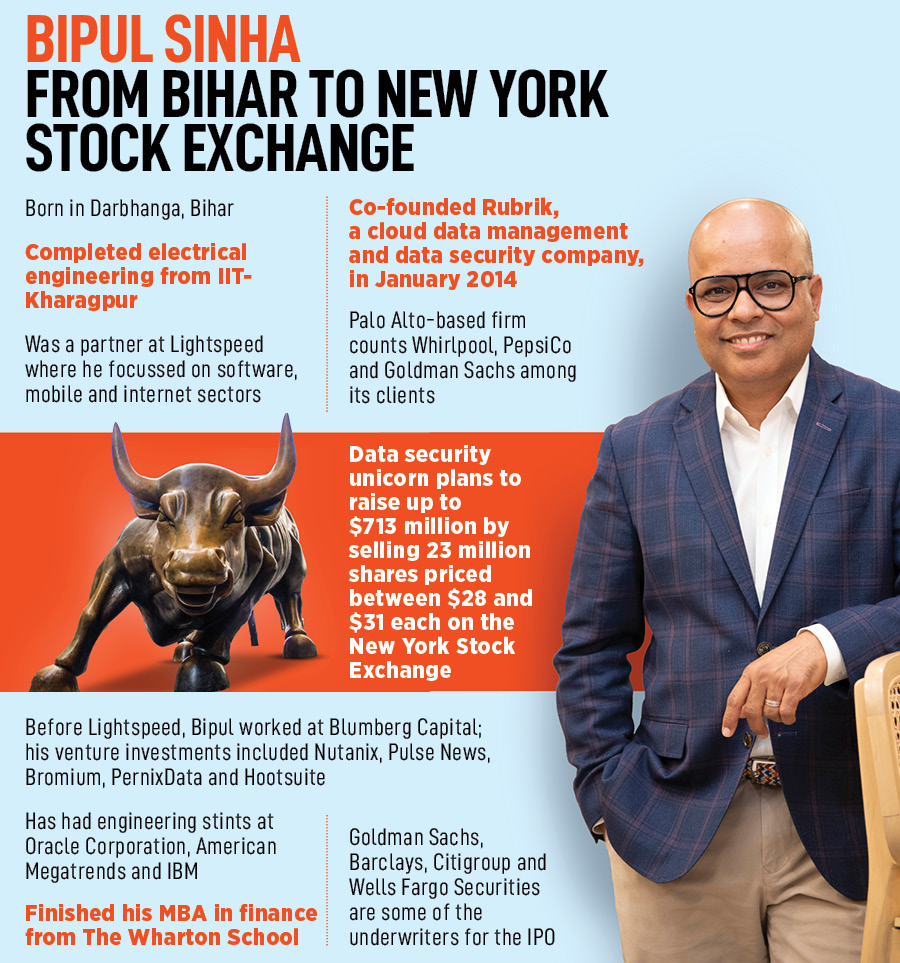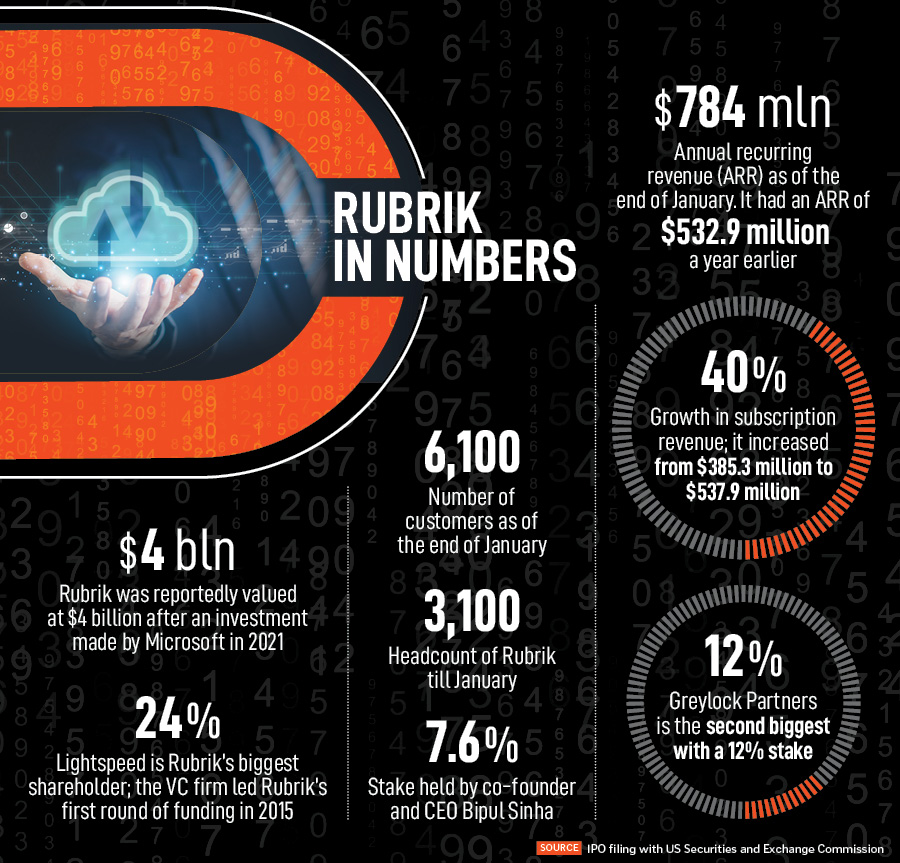
From Bihar to California: Rubrik, NYSE, and the American Dream
Born into poverty, Bipul Sinha fought formidable odds to make it to IIT Kharagpur. The engineering graduate from Bihar discerned that his salvation lay in pursuing the American Dream, and started Rubrik in 2014. A decade later, the Microsoft-backed cyber security unicorn is all set to get listed
 Bipul Sinha, CEO & Co Founder, Rubrik. Image: Hemant Mishra for Forbes India
Bipul Sinha, CEO & Co Founder, Rubrik. Image: Hemant Mishra for Forbes India
It seemed like a panic attack. Bipul Sinha was jolted out of his sleep in the dead of night. The rookie founder sat upright, wiped his clammy palm, grabbed the air conditioning remote tucked under his pillow, and turned down the temperature. It didn’t work. Beads of sweat dripped down his forehead. “What the heck have I done with my life,” the venture capitalist-turned-entrepreneur wondered. “If I fail, how will I go back,” he pondered. “What will happen to my venture? No, I just can’t go back as a failed founder,” Sinha mumbled and persisted with his soliloquy.
Sinha had all the reasons to feel miserable. It had been over 45 days since he had co-founded Rubrik, a cloud data management and data security company, in January 2014, and there had been zero hiring. “If there is nobody to write the code,” the IIT Kharagpur alum asked himself, “how will the startup kick off?”
In little over six weeks, Sinha might have interviewed dozens of potential candidates, but all failed to make the final cut. “There was nothing to work, nothing to begin, and nothing to show,” recalls the rookie founder who shadowed the entrepreneurs in his earlier avatar as a venture capitalist (VC), sat on the sidelines, and mentored scores of young founders who were stomping around the entrepreneurial world.
As a VC, Sinha was nothing less than a kingmaker. While at Lightspeed, he focused on software, mobile, and Internet sectors, Sinha’s earlier stint at Blumberg Capital involved bets such as Nutanix, Pulse News, Bromium, PernixData, and Hootsuite. “I was navigating founders with ideas around marketing, product launch, and product-market fit,” he recounts.
His work had lulled him into a belief that he was better cut out to become a founder. “If I'm so passionate as a VC, why can’t I start my venture,” reasoned the VC who had engineering stints at Oracle Corporation, American Megatrends, and IBM before making the transition to the venture world. Now, the kingmaker wanted to become a king.
There was a small problem. The king didn’t have a kingdom. “As a hotshot VC, I thought making a transition to a founder would be a cakewalk,” quips Sinha, who was recently in India to review Rubrik’s operations in a country that has seen a doubling of ransomware attacks last year to around 4,200 last year, according to a threat intelligence report by Cyble. Another survey painted an equally alarming picture. Nearly 73 percent of mid and large-sized companies in India were hit by a ransomware attack in 2023, according to cybersecurity firm Sophos.Also read: Cyber criminals are getting smarter. Laws and awareness need to keep up
Meanwhile, at Palo Alto in 2014, the self-proclaimed king was trying hard to recruit his army. Though hiring eventually stabilised over the next few quarters, trouble started brewing on another front. People wanted to buy faster horses as opposed to cars. Sinha explains. “Selling products was a harder challenge because nobody wanted to buy a disruptive product,” he says, adding that Rubrik was taking backup and recovery, and was transforming the cyber landscape with its radical tech architecture. The biggest flip side of being a first in the industry--call it the bane of disrupting the market—is that people don’t buy the story.

Skepticism was natural. Most mid-sized and big companies, especially financial services and institutions, were traditionally wired. Though they had liked Rubrik’s offering, they stayed conservative when it came to taking risks. “They wanted a newer version of the old legacy,” says Sinha. Consequently, during the initial phase of the journey, Rubrik lost a flurry of financial services deals. “It hurt us badly,” he says. “We had racing cars,” underscores the electrical engineer. “But they wanted faster horses,” he adds. Business dollars were hard to come by as digital trust was a weak currency in the market.
Fast forward to April 2024. Rubrik is all set to test its currency on the New York Stock Exchange. The Microsoft-backed cybersecurity unicorn—Rubrik was reportedly valued at $4 billion after an investment made by Microsoft in 2021—has filed for an initial public offering (IPO) in the US, and reportedly plans to raise as much as $713 million.
According to its IPO filings, as of January 2024, the company had over 1,700 customers with an annual contract value of $100,000, close to 100 customers paid Rubrik over $1 million a year, and the tech unicorn has seen growth in its revenue from $599.8 million to $627.9 million in a year. Though revenue growth has been modest, a jump in subscription revenue by 40%--from $385.3 million to $537.9 million—augurs well for the company which is moving quickly towards a recurring revenue regime.Also read: New listings face the threat of $21.1 bln drain-out with IPO lock-ins set to expire
In India, Rubrik is bullish on the big opportunity. Though Sinha declined to comment on revenue and the IPO plans, he underlined how India has the potential to emerge as a big market for the company over the next decade. “Close to a third of our workforce resides in India,” he says, adding that no global company can afford to miss the untapped India opportunity.
Rubrik, he lets on, has built a double-engine R&D structure based out of Palo Alto and Bengaluru. “The market is massive. That’s why I am here. This is my fifth trip in the last 12 months,” says the software engineer who opened his first India office in 2017. Six years later, in July 2023, Rubrik rolled out a $10-million ‘ransomware recovery warranty’ in India. The intent was to build confidence and digital trust as a currency.
Back in the early 90s, Sinha was struggling on both fronts: Confidence and currency. Born in Darbhanga, which was then a small town in north Bihar, Sinha’s childhood was dotted with poverty and economic hardships. His father had a challenging life as an entrepreneur, struggled to make ends meet, and his maiden pharma company couldn’t survive for long. Strapped for cash, the failed founder relocated to another small town in Bihar. Misfortune followed him.
He raised a loan from the Bihar state government, made another attempt to start a pharma unit, and persisted for a few years. It didn’t work, he once again relocated and managed to get a modest-paying job. A new place and a new job, though, did little to alleviate the misery of the family.
“Our shack was in an area which always used to get inundated during the monsoons,” recalls Sinha, adding that there were weeks when the family used to stay confined to its pony-thatched house. If one is born and brought up in poverty, he underlines, the only thing that one becomes good at is maximising opportunities. “For me, it was one day and one opportunity at a time. All I could think was how to maximise whatever I had,” he reckons. Education, he adds, emerged as the only road to salvation.Also read: Valuation of most listed new-age tech companies not frothy: Raamdeo Agrawal
The family didn’t have the resources to afford a private school for the young kid, and Sinha continued to learn in his mother tongue—Hindi—during much of his formal education years, and the education gap became too big to be bridged. The idea of engineering, he underlines, was seeded by his father who looked upon it as a silver bullet to end the family woes. But there was no money to afford coaching. The young boy came up with an ingenious plan. He bought 30 postcards--each came for 15 paise—and sent them to all the coaching institutes across the country. “I wanted to have a look at the prospectus, and syllabus and then prepare a rough framework of how to prepare for the exam,” he says.
The jugaad didn’t work. “I failed in my first attempt,” says Sinha. “I couldn’t clear any exams,” he says, adding that his tryst with English, math, physics, and chemistry started when he was 14. Sinha even failed to clear engineering exams conducted by the Bihar state government. He was dejected, but his father remained confident. “Prepare for one more year,” he advised. “And look at the silver lining. Had you cleared the state exams, you would have lost an opportunity to make it to IIT,” he smiled.
For somebody who didn’t like math, engineering now became a bread-and-butter issue. Sinha tweaked his exam strategy during the second year of his preparation. This time, the young lad decided to join hands with another engineering aspirant, pooled and shared resources—Sinha’s mother borrowed money from her relatives—bought coaching material, and made it to IIT. Last year of college, he landed a job at Tata Information System (a Tata-IBM joint venture) via campus placement. The achievement was nothing short of magic.

Sinha, though, was looking for a miracle. A few months into the job, he realised that he needed an overseas stint to pull his family out of the financial abyss. There was money in India, but the young engineer was racing against time. “I wanted to upgrade the life of my family as soon as possible. And America was the only hope,” he added. The big opportunity came in the form of American Megatrends, and then after a few years, Sinha honed his skills at Oracle. He then switched careers and donned the hat of a venture capitalist. A few years later, the restless soul decided that entrepreneurship was his calling, and cofounded Rubrik with Arvind Nithrakashyap, Arvind Jain, and Soham Mazumdar in 2014. Also read: New-age company IPOs have been a disappointment. Are VCs to blame?
A decade later, Sinha is living the American dream. His Palo Alto-based startup is planning an American public listing, Rubrik counts Whirlpool, PepsiCo, and Goldman Sachs among its long list of clients, and the company was last valued at $4 billion.
“Can the same story play out in India,” I try to find out if somebody coming from a similar background can make it big in the country. India too, Sinha underlines, is a land of opportunity, but the VC-turned-founder found his salvation in the US. “America gives you a fighting chance,” he says. No matter how you look, where you come from, and whatever your background, Sinha points out, America allows you to live your dream.
From a ramshackle one-room shanty in Bihar to building a tech unicorn which is set to debut at NYSE, Sinha for sure is living his dream.
Post Your Comment


















